In Pembroke, steep tax increase leads residents to cut school budget
| Published: 03-09-2024 5:25 PM |
The way William O’Mahoney saw it, Pembroke voters had two options: price out the elderly or support schools. With a proposed budget of $33.8 million delivering a 28% tax increase, it was hard to feel like one didn’t come at the expense of the other.
At 69-years-old, O’Mahoney is a retired army veteran living on a fixed income in town. For his two-bedroom log cabin, he was looking at a tax bill of nearly $9,000 next year.
“What I see happening here is an impoverishment of the elderly on behalf of the school system,” he said.
The $33.8 million budget would have increased taxes by $2,346 annually for a home worth $300,000, not counting any other school items or increases on the town side.
O’Mahoney took to the microphone in the Pembroke Academy gym on Saturday and proposed an amendment: to cut the school budget by just over $3 million. It passed on 305-134 vote.
The Pembroke school board will have to sit down and decide where to eliminate $3 million, said Andy Camidge, the school board chair. Since more than half of the budget is fixed costs, that’s not an easy task.
Increases to Pembroke’s school budget come from three main factors, said Camidge. First, is a $1.4 million increase to special education funding. Transportation and staff benefits, like health care and retirement contributions, make up the next largest chunks of the proposed spending.
“We are mandated by law to provide services, but sadly we don’t get money to provide those services,” he said. “So that falls to us.”
Article continues after...
Yesterday's Most Read Articles
 ‘Deep flavor’ – New restaurant in downtown Concord offers creative spin on comfort food and cocktails
‘Deep flavor’ – New restaurant in downtown Concord offers creative spin on comfort food and cocktails
 ‘Over-regulation is going to create sneakier kids’: Concord High students react to impending bell-to-bell phone ban
‘Over-regulation is going to create sneakier kids’: Concord High students react to impending bell-to-bell phone ban
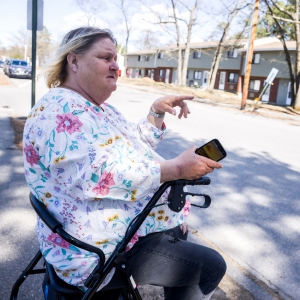 Royal Gardens tenants worried about where they will live after building renovations
Royal Gardens tenants worried about where they will live after building renovations
 Reclaiming Healy Park: A symbol of renewal and a reckoning with homelessness in Concord
Reclaiming Healy Park: A symbol of renewal and a reckoning with homelessness in Concord
 Concord receives federal funding to clean old stables, paving way for stagecoach museum
Concord receives federal funding to clean old stables, paving way for stagecoach museum
 Concord-area runners tackle Mt. Washington Road Race
Concord-area runners tackle Mt. Washington Road Race
That’s the crux of the issue to Sarah Petersons. State education funding for New Hampshire public schools is structured so it falls on the shoulders of local taxpayers.
“Many of these programs are federally mandated, that we must pay for. And so that doesn’t go away with any cuts to the budget,” she said. “Those are what we refer to as unfunded mandates.”
By law, each school district has to accommodate special needs students and services to support them, which can mean anything from providing transportation to out-of-district school placements, like charter schools or occupational or speech therapies.
The state funds less than 20 percent of special education expenditures, according to the New Hampshire School Funding Fairness Project.
For 14 years, Peter Mehegan ran the drama program in Pembroke, managing 50 students and asking the community for support for their shows. And he saw firsthand how students with special needs can flourish with the right support. But in some instances, that means spending $100,000 a year on a single student.
“There’s no control of the budget when the bottom line is mandated by special ed,” he said. “There’s something really wrong and we adults have to say no, as it’s just wrong.”
While the $3 million budget cut was met with cheers from the gym bleachers, Kevin Foss wasn’t impressed. This proposal was made without understanding where the cuts will come from, he said.
“I don’t think people understand how catastrophic $3 million would be,” he said.
Foss made a motion to cut the budget by half a million dollars, bringing it to $33.2 million, which failed 122 to 291. The new budget of $30 million passed with a show of cards, and a motion to restrict reconsideration was also passed.
Now it will be up to the school board, with guidance from Superintendent Patty Sherman, to find fat to trim in their proposed budget. On average, Pembroke already spends $2,000 less than the state average per pupil at $18,000.
The district has plenty to be proud of – Pembroke Academy was named one of the best high schools in the state; New Hampshire’s Teacher of the Year was an elementary school teacher in the district; the robotics program is off to nationals in Iowa; and two sports teams are playing in state championships this weekend.
The proposed budget would have brought the district up to par with state averages and neighboring schools, said Camidge.
But to bring spending up to speed, means pressing the pockets of elderly residents in particular, said Ray Olivier.
Since 2015, Olivier, 65, has watched his tax bill increase each year, with the lion’s share going to school funding. At a certain point, fundraising or layoffs need to offset what the school board is asking taxpayers to fund, he said.
“You’re not supporting the students by overburdening the taxpayers,” he said.
Steep increases year after year are a detriment to the town, Deanna Dumont, added. As the taxes continue to go up, people will start to leave town. If they have children in tow, revenue for the school will drop, and the burden on the remaining residents will grow.
“It’s going to affect that bottom line,” she said. “There’s a trickle-down effect."
While the budget took a 10% cut, voters decided to give raises to some of the lowest-paid employees in the district.
Town residents voted to approve a new four-year collective bargaining agreement for the Pembroke Paraprofessional Association. It’s the second agreement with the district since the union was formed in 2020.
Denise Steelman, the union president, has worked in the district for 24 years. The new bargaining agreement provides insurance increases, pay raises and other support for staff, she said.
The agreement will make the district more competitive with neighboring schools, she said. Across the state, hiring paraprofessional support staff has challenged districts.
Crafting the budget was not an easy feat this year, said Camidge. Now their work isn’t finished, either.
“We know that this tax hits all of us and our properties as well,” he said. “We don’t do any of this without the taxpayers in mind. So I hope you can trust when I say that we are presenting this because we really did think this was in the best interest of the students and faculty and staff.”
Superintendent Sherman never spoke throughout the duration of the five-houmeeting.
The town budget will be voted on next Saturday, March 16 at 10 a.m..

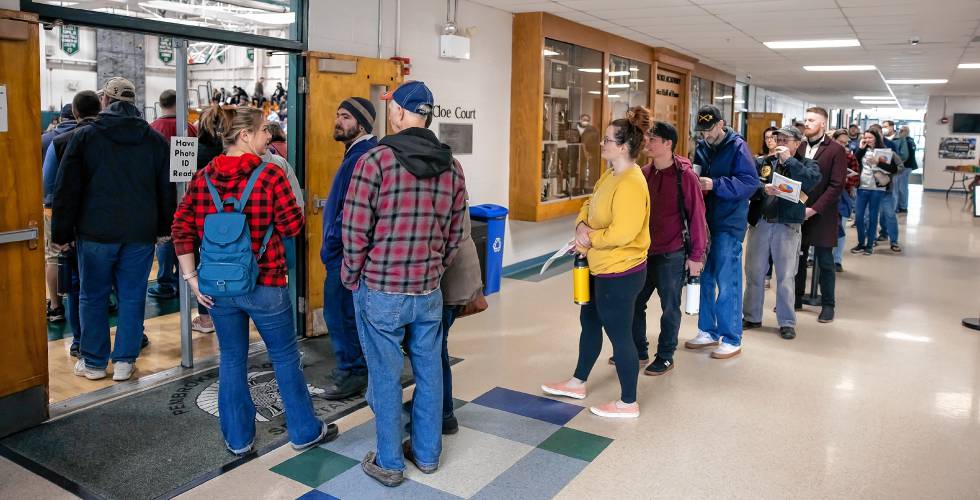
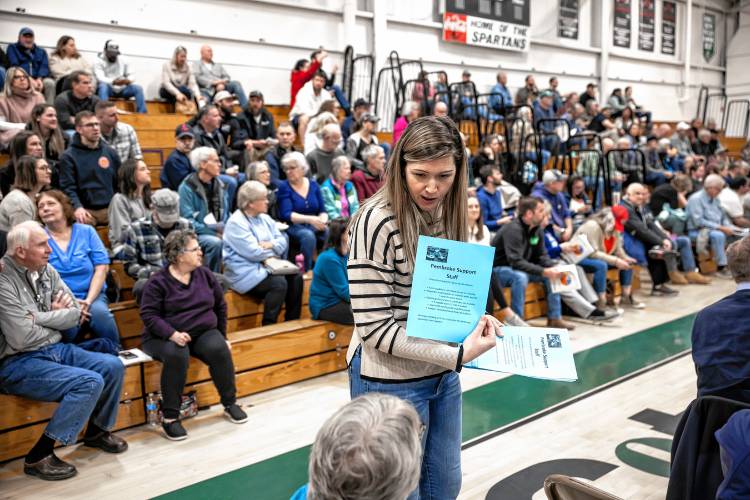
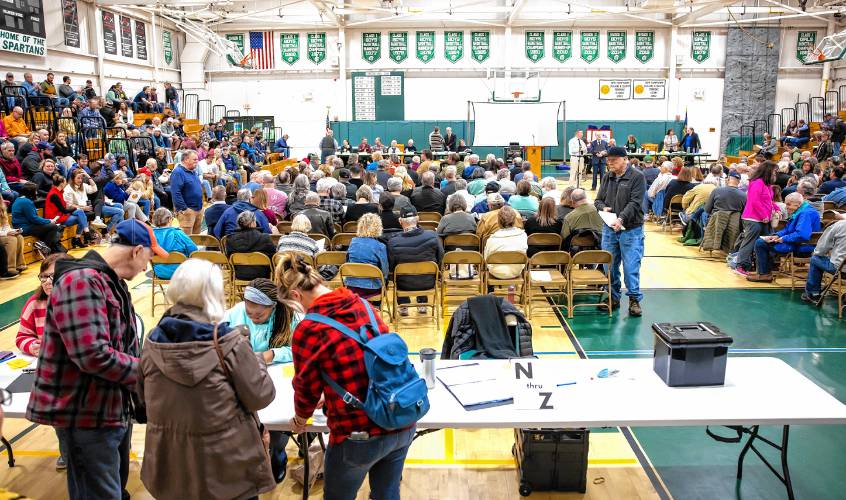
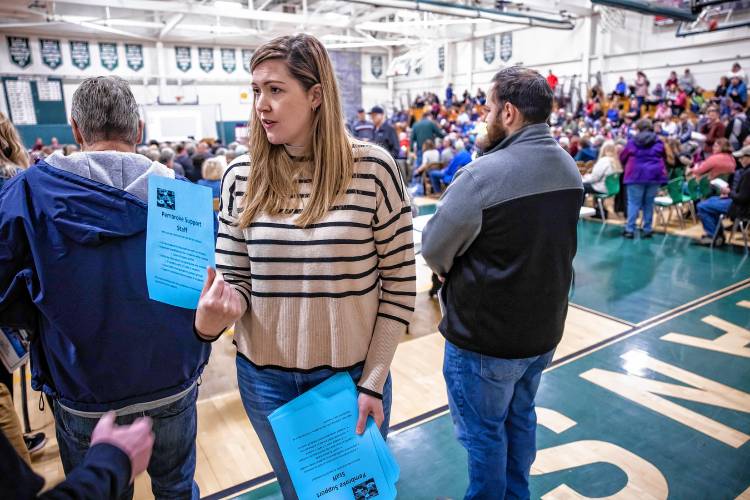
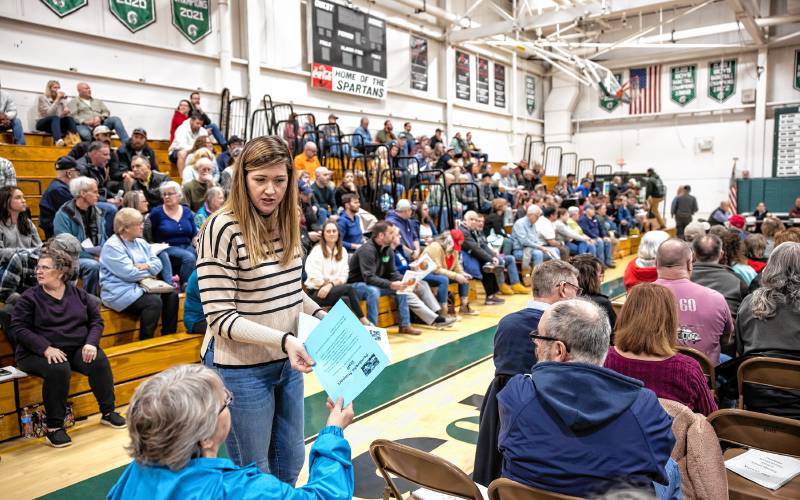






 Photos: A Downtown ‘I Do’ at Market Days in Concord
Photos: A Downtown ‘I Do’ at Market Days in Concord Granite Geek: The circle of life is painful when watching the species-gets-killed part
Granite Geek: The circle of life is painful when watching the species-gets-killed part Concord’s two Rite Aid stores shutting soon
Concord’s two Rite Aid stores shutting soon
